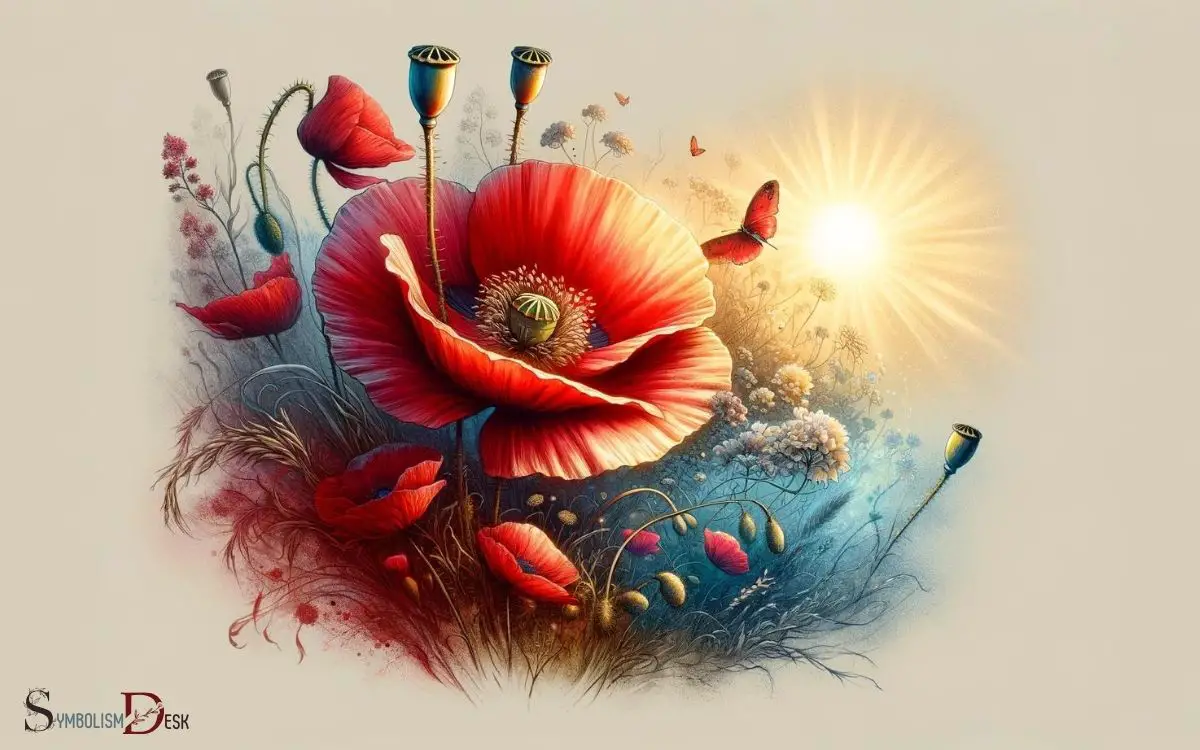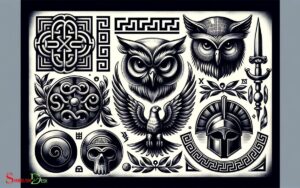What Does a Poppy Tattoo Symbolize? Peace!
A poppy tattoo is a profound emblem, often associated with remembrance, peace, and resilience.
It stands out for its significant historical roots and is imbued with cultural and emotional meanings, ranging from ancient symbolism to commemorating soldiers who have died in war.
The poppy tattoo is rich in symbolism and varies across different cultures and contexts:
- Remembrance: Most commonly, poppy tattoos are linked with remembrance, especially of soldiers who have died in war. This association is particularly strong due to the red poppies that grew on the battlefields of World War I in Europe.
- Peace and sleep: The poppy flower is often connected with sleep and peace, a symbolism deriving from the sedative properties of some poppy species like the opium poppy.
- Resilience and hope: Despite its delicate appearance, the poppy is a hardy flower able to grow in difficult conditions, symbolizing resilience and the ability to thrive despite challenges.
- Beauty and life: With its bright red petals, the poppy is also a symbol of beauty and the joys of life, reminding individuals to cherish each moment.
A poppy tattoo encapsulates themes of honor, memory, and the enduring human spirit within its vivid bloom.

Key Takeaway
Historical Significance of the Poppy Tattoo
The poppy tattoo has a deep historical significance, dating back to ancient civilizations and continuing to hold symbolic importance across various cultures.
In ancient Greek and Roman mythology, the poppy was associated with Morpheus, the god of dreams, and was often used as a symbol of sleep, peace, and death.
During the Napoleonic wars, the poppy became a symbol of remembrance and sacrifice. Its significance was further solidified by the famous poem ‘In Flanders Fields’ by John McCrae, which linked the poppy to the memory of fallen soldiers.
The poppy also holds cultural and religious significance in many Eastern countries. Over time, the poppy tattoo has come to represent not only remembrance but also resilience, recovery, and the beauty that can arise from difficult circumstances.
Symbolism of Remembrance and Memorialization
Symbolized by the poppy tattoo, the symbolism of remembrance and memorialization is deeply rooted in historical and cultural significance, representing the memory of fallen soldiers and the resilience and recovery that can emerge from difficult circumstances.
The vibrant red color of the poppy evokes a vivid image of sacrifice and bravery, honoring the lives lost in conflict.
This imagery is further enhanced by the delicate petals of the poppy, symbolizing the fragility of life and the enduring nature of memory and legacy.
The poppy tattoo serves as a poignant reminder of the sacrifices made by those who’ve served their country and a testament to the enduring spirit of remembrance and memorialization.
Poppy Tattoo as a Representation of Beauty and Resilience
Representing both beauty and resilience, the poppy tattoo embodies the enduring strength and grace that can arise from adversity, serving as a powerful symbol of hope and courage.
The poppy’s delicate petals and vibrant colors are often associated with the idea of beauty, while its ability to thrive in harsh conditions speaks to its resilience.
This duality makes the poppy tattoo a meaningful representation of overcoming challenges with grace.
The table below illustrates how the poppy tattoo symbolizes beauty and resilience:
| Beauty | Resilience |
|---|---|
| Represents delicate and vibrant beauty | Thrives in harsh conditions |
| Symbolizes grace and elegance | Endures and perseveres through adversity |
| Embodies the concept of inner strength | Serves as a reminder of resilience |
Cultural and Mythological Meanings of Poppy Tattoos
Cultural and mythological meanings of poppy tattoos have intrigued historians and anthropologists for centuries.
In various cultures, poppies have symbolized diverse concepts, such as:
Remembrance and Mourning:
- In many cultures, poppies are associated with remembrance and mourning, often linked to commemorating fallen soldiers or loved ones who’ve passed away.
Mythological Significance:
- In ancient mythology, poppies have been connected to various deities and myths, representing aspects such as fertility, sleep, and even death.
These culturally rich associations with poppies have contributed to the enduring popularity of poppy tattoos.
Understanding the deep-rooted cultural and mythological meanings of these tattoos can provide valuable insight into the diverse perspectives and symbolism surrounding poppies.
Transitioning into the subsequent section about the ‘personal and emotional meaning of poppy tattoos’, it becomes evident that these intricate designs hold profound significance for many individuals.
Personal and Emotional Meaning of Poppy Tattoos
The personal and emotional meaning of poppy tattoos often reflects an individual’s deeply held sentiments and personal connections.
People choose to get poppy tattoos for various personal reasons, and the emotional significance behind these tattoos can be quite profound.
Here are some common personal and emotional meanings associated with poppy tattoos:
| Meaning | Description |
|---|---|
| Remembrance | Many individuals get poppy tattoos as a way to honor and remember loved ones who have passed away. |
| Resilience | Some people view the poppy as a symbol of resilience and strength, particularly in overcoming challenges or adversity. |
| Connection | Poppy tattoos can also represent a personal connection to nature, beauty, or specific memories and experiences. |
These personal meanings add depth and significance to poppy tattoos, making them a powerful form of self-expression.
Conclusion
The poppy tattoo holds deep historical and cultural significance, symbolizing remembrance, beauty, and resilience.
Its association with memorialization and emotional connections to personal stories make it a timeless and meaningful choice for those seeking to honor loved ones or express their own inner strength.
The poppy tattoo is a timeless symbol that continues to bloom in the hearts of those who wear it, reminding us to never forget the sacrifices of the past.







